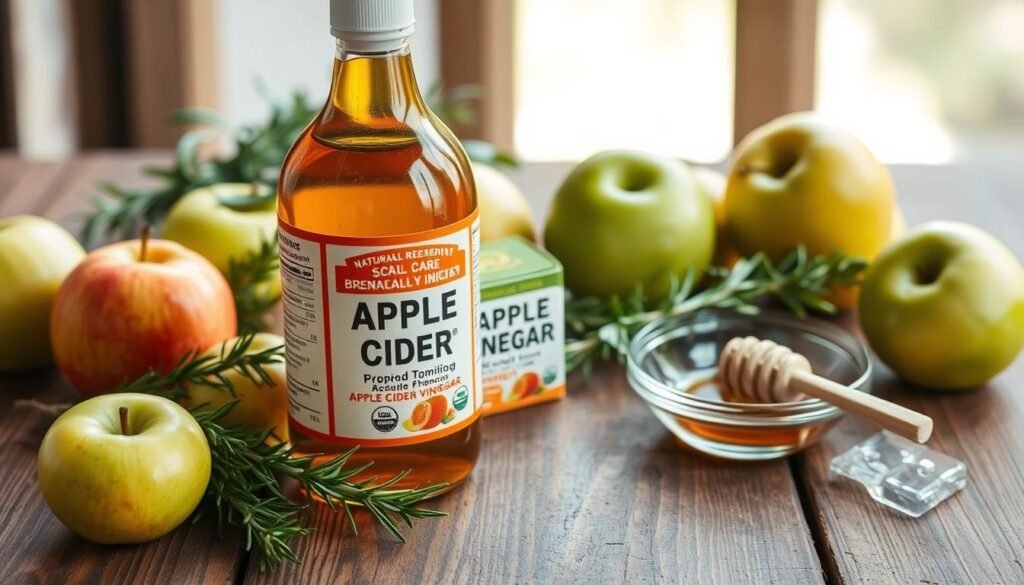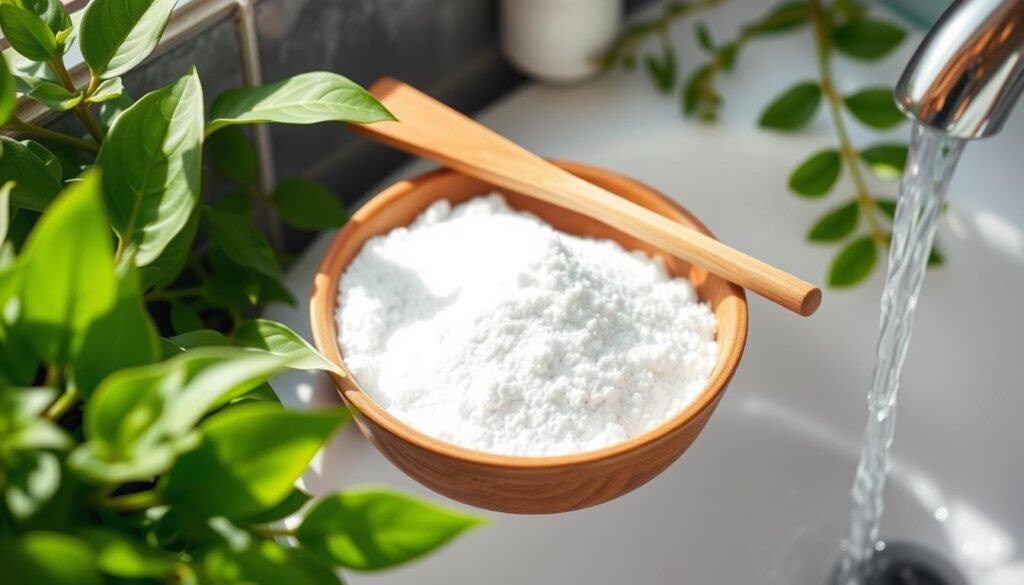Did you know more than half the world faces dandruff once in their life? This scalp problem causes discomfort and worry. But, there’s good news! Natural solutions may lie in your kitchen.
Dandruff isn’t just annoying. It affects your day with flaking and itching. Yet, there’s hope with simple items from your pantry. We’ll share easy and cheap ways to ease dandruff. For detailed dandruff help, see this resource.
Key Takeaways
- Dandruff impacts over half the world at some stage.
- Itchy head can cause embarrassment and distress.
- Try home treatments for easy dandruff relief.
- Look no further than your kitchen for answers.
- Finding what works for you may require some tests.
Understanding Dandruff and Its Causes
Dandruff can feel like a minor issue, yet its causes are important to know for treatment. The key to this problem is understanding the role of skin cells. These cells are vital for a healthy scalp and influence dandruff.
The Role of Skin Cells
The scalp sheds skin cells as part of a normal cycle. But when too many cells pile up, they form visible flakes known as dandruff. Issues like seborrheic dermatitis and psoriasis can speed up this shedding. This leads to more noticeable dandruff. Knowing about skin cell renewal is the first step towards finding a solution.
Common Triggers for Dandruff
Many things can trigger dandruff, affecting people differently. Stress is a big trigger. Hormone changes and the environment also play roles. Not eating right can make things worse. Recognizing these dandruff causes helps people find what triggers their condition. For more on this, visit this link.
Dandruff: Home Remedies
Many folks turn to home remedies to fight dandruff. They prefer them for their gentleness over harsh chemical products. These natural options help ease symptoms and nourish the scalp. They’re also easy to use, using common ingredients found at home.
The Benefits of Natural Treatments
Natural remedies offer several benefits. They treat dandruff causes without the side effects of commercial products. For example:
- Gentle on the scalp: They maintain essential oils, reducing irritation.
- Fewer chemicals: Mild solutions decrease the chance of bad reactions.
- Economical: They often use items you already have at home.
Exploring natural remedies can lead to better scalp health and control of dandruff.
How to Choose the Right Remedy
When picking a remedy, consider your preferences and how sensitive your scalp is. Keep these points in mind:
- Identify your needs: Knowing if dry skin or a fungus causes your dandruff is key.
- Assess available ingredients: You might already have things like coconut oil or apple cider vinegar.
- Experiment gradually: Test different remedies to see which ones help the most.
Looking into options helps you find what works best. Check out reliable sources like this article for more info. A bit of patience can bring the relief you need.
Apple Cider Vinegar: A Natural Solution
Apple cider vinegar is a popular natural remedy for dandruff. Its acid level matches well with our scalp’s needs. This match may discourage unwanted yeast from growing. Although science isn’t fully on board yet, lots of folks find it works for them.
How Apple Cider Vinegar Works
Apple cider vinegar is known for its anti-fungal power. It can soothe irritation and make flaky skin less of a problem. When used on the scalp, it helps get rid of dead skin. This leaves your head feeling cleaner and fresher.
Application Tips for Best Results
Getting the most out of apple cider vinegar is easy if you follow these tips:
- Dilution: To avoid irritation, mix the vinegar with water. One part vinegar to two parts water is best.
- Frequency: Applying this blend once or twice a week keeps your scalp happy without overdoing it.
- Routine: Try using it after you shampoo. Let it sit for a bit, then rinse well.
If you want more info, check out this helpful article. It has lots of details on using apple cider vinegar against dandruff.

| Benefit | How It Helps |
|---|---|
| Balances pH Levels | Keeps scalp skin healthy, reducing the chance of irritation. |
| Antifungal Properties | Helps stop yeast growth, which is a common dandruff cause. |
| Reduces Flakiness | Helps remove dead skin cells for a healthier scalp look. |
Coconut Oil and Its Antifungal Properties
Coconut oil is a natural fix for those with dandruff. It’s known for fighting the fungus causing scalp issues. Using it regularly keeps the scalp moist. This prevents dryness and makes the scalp healthier.
Why Coconut Oil is Effective
Coconut oil has lauric acid, which fights fungi well. This is why it’s great against dandruff. It also hydrates deeply. This soothes the scalp and reduces flaking and itching.
Ways to Use Coconut Oil on Scalp
There are several ways to use coconut oil in your hair routine:
- Pre-shampoo treatment: Apply it on your scalp and hair 30 minutes before you shampoo. It locks in moisture and gets hair ready for washing.
- Overnight mask: For deeper treatment, rub it into your scalp before bed. Wear a shower cap to keep your pillow clean, then wash it off in the morning.
- Leave-in conditioner: After washing your hair, apply it lightly. This helps keep your hair smooth without making it greasy, which is good for those with oily scalps.
| Method | Description | Best For |
|---|---|---|
| Pre-shampoo treatment | Apply before shampooing to prepare and moisturize | Dry scalps needing hydration |
| Overnight mask | Intensive treatment for deep moisture | Severe dryness and irritation |
| Leave-in conditioner | Sparingly apply after washing to improve manageability | Oily scalps seeking light hydration |
The Benefits of Scalp Massage
Scalp massages are great for your health. They boost blood flow to your head. This means your hair grows healthier and dandruff might reduce. Knowing how important blood flow is shows why scalp massages are beneficial.
Enhancing Blood Circulation
Healthy hair needs good blood circulation. More blood flow brings oxygen and nutrients to your scalp. This helps your hair grow and keeps your scalp healthy. Doing regular scalp massages helps avoid problems like dandruff.
Techniques for Effective Scalp Massage
Adding a scalp massage to your daily routine is easy. You don’t need special tools. Here are some techniques:
- Gentle fingertips: Softly press in circles all over your scalp with your fingertips.
- Knuckle massage: Use your knuckles for a deeper massage.
- Rubbing and kneading: Knead your scalp like you’re kneading dough.
These methods can help your scalp get more blood. Regular massages help your hair health. They can also help with dandruff. For more tips on a healthy scalp, click here.
Baking Soda: A Gentle Exfoliant
Baking soda is great for scalp care, helping fight dandruff effectively. Its mild roughness helps get rid of hair product residue and dead skin, leaving your scalp refreshed. It also helps keep the pH balance right, important for healthy hair and skin.
How Baking Soda Fights Dandruff
Baking soda’s slight alkalinity helps neutralize extra acidity on the scalp. This reduces itchiness linked with dandruff. It also removes dead skin cells that cause flakiness. Using baking soda can improve scalp health a lot.

To use baking soda, mix it with water to make a paste. Gently rub it on your scalp once or twice a week. Afterward, use a moisturizing conditioner to keep your hair from drying out. Baking soda is a gentle exfoliant for the scalp, perfect for those seeking natural dandruff solutions.
Tea Tree Oil: Power of Nature
Tea tree oil is loved for fighting dandruff naturally. It kills the fungi causing an itchy scalp. Knowing how to use it properly can ease dandruff problems.
Antimicrobial Effects of Tea Tree Oil
This oil has special compounds that stop bacteria and fungi. It’s like a natural antiseptic for your scalp. This helps your hair grow healthier by making the scalp a better place. Using it often can really show a difference, which is why many pick it as a natural solution.
How to Use Tea Tree Oil for Dandruff
To get the best from tea tree oil, you need to apply it right. Here’s how:
- Dilute tea tree oil: Mix it with coconut or olive oil to make it gentler and reduce irritation.
- Add to shampoo: Putting tea tree oil in your shampoo can help fight dandruff each time you wash your hair.
- Create a scalp treatment: Mix tea tree oil with witch hazel or aloe vera for a calming scalp mask.
Being consistent with tea tree oil can improve your scalp’s health. It’s all about understanding its benefits and including it in your hair-care routine. This could be the answer for those who have dandruff issues.
Lemon Juice: Natural Acidic Treatment
Lemon juice is a powerful natural remedy for dandruff. Thanks to its acidity, it helps maintain a healthy scalp pH. A disrupted balance often leads to dandruff. Lemon’s citric acid cuts down on oil and reduces flakiness and itching. Its high vitamin C content boosts scalp health, making it a top choice for relief seekers.
How Lemon Juice Helps with Dandruff
Lemon juice is effective against dandruff because of its unique properties. It creates an acidic environment, fighting off dandruff-causing microbes. Not only does it lessen flakes, but it also calms scalp irritation. This makes the scalp healthier overall.
Application Methods for Lemon Juice
How you apply lemon juice can make a big difference. Several methods can integrate lemon juice into your dandruff care routine:
- Direct Application: Apply fresh lemon juice directly onto the scalp, massaging gently. Leave it for 30 minutes before rinsing with cool water.
- Mix with Oils: Combine lemon juice with coconut oil or olive oil for an added moisturizing effect. This reduces potential dryness while providing nourishment.
- Lemon Juice Rinse: Combine lemon juice with water to create a rinse. Use it after shampooing to balance the scalp’s pH and enhance shine.
For more information on using lemon juice against dandruff, check out this resource.
| Application Method | Description | Benefits |
|---|---|---|
| Direct Application | Fresh lemon juice applied straight to the scalp. | Effective against flakes and irritation. |
| Mix with Oils | Blending lemon juice with coconut or olive oil. | Moisturizes while combating oiliness. |
| Lemon Juice Rinse | Diluting lemon juice in water for a scalp rinse. | Balances pH and enhances shine. |
Conclusion
People looking for dandruff relief have many home remedies to try. Apple cider vinegar, coconut oil, and tea tree oil are really good options. They don’t just lessen symptoms but also help keep your scalp healthy.
For the best outcomes, staying consistent and living healthy is crucial. Adding these natural remedies to your routine can make a big difference. This approach, combining nature’s gifts and good scalp care, fights dandruff effectively.
This guide emphasizes the power of personal hair care choices. By trying out various treatments to see what fits, individuals can confidently move towards healthier hair. They’ll know they’re using treatments that meet their specific needs.